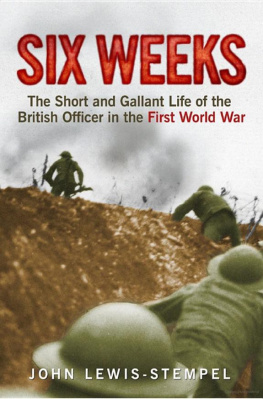SIX WEEKS
The Short andGallant Life of the British Officer in the First World War
John Lewis-Stempel
This paperback edition published in 2011
Copyright John Lewis-Stempel 2010
Contents
List of Illustrations |
Prologue |
Introduction |
| Hello to All This: School and Joining Up |
| Arms and the Gentleman: The Training of the Officer |
| I Like to Hear the Allymans Shells: The Journey to the Front Line |
| Trench World: Life and Death in the Trenches |
| To Serve Them All My Days: Leadership in the Trenches |
| Over the Top: Into Battle |
| Its a Long Way to Tickle Mary: Rest and Leave |
| We Are the Dead: Wounds and Hospitalization, Burials and Grief |
| Last Post: When the War Was Over |
Acknowledgements |
List of Illustrations
Schoolboysat Eton College playing the Wall Game. (Mary Evans Picture Library)
An officerleads a contingent of the Officers Training Corps on a march at Mytchett Camp,Surrey, 1910. (Mary Evans Picture Library)
Uppinghamschoolboys Edward Brittain, Roland Leighton and Victor Richardson at OTC camp.(The Vera Brittain Estate and William Ready Division of Archives and Research Collections, McMaster University, Hamilton, Canada)
AnthonyEden at Aldershot, 1915, aged 18. (Getty Images)
TerritorialCaptain Lionel Crouch (Private collection)
Studentsfrom Cambridge Universitys Officer Training Corps have their rifles inspected atMytchett Camp, Summer 1914. (Imperial War Museum)
Ledby a sergeant instructor, officer cadets distinguished by their white hat bands take a riding lesson at Aldershot. (Imperial War Museum)
Officersfinishing their leave say goodbye to their wives and family at Charing Cross. (ImperialWar Museum)
Britishofficers travelling by rail in France. (Mary Evans Picture Library)
Officerstossing a colleague in a blanket on board ship, 1915. (Getty Images)
SecondLieutenant F. Forrester Agar and his bride Majorie Laird Collins, June 1917. (GettyImages)
A pillowfight at the Guards Division Sports Day at Bavincourt, June 1918. (Imperial WarMuseum)
Britishtroops receive hot stew in the trenches near Cambrai. (Mary Evans Picture Library)
Membersof a wiring party set out to lay new wire. (Getty Images)
Officersof the 12/East Yorkshire Regiment wash and shave in a dug-out near Roclincourt.(Imperial War Museum)
An officerof the Royal Field Artillery feeds his pet duck outside a dug-out in Salonika.(Imperial War Museum)
Britishinfantry officers observe and mark the enemys movements on a map at Pilckem Ridge,Belgium, 1917. (Mary Evans Picture Library)
Officerswade through mud in a trench near St. Quentin, 1917. (Getty Images)
A doctordresses the wounds of Lieutenant Guy Morgan, Irish Guards, at a Regimental Aid Postat Pilckem Ridge, 1917. (Imperial War Museum)
TheOfficers Quarters at Rastatt prisoner of war camp,near Karlsruhe, Germany. (Imperial War Museum)
Officersof the 1st Royal West Kent Regiment pose fortheir picture a day before their attack on Hill 60, 1915. (Courtesy of The Princessof Wales Royal Regiment)
Cartoonfrom The Wipers Times : Am I Offensive Enough? (Authors collection)
OfficerPOWs captured during the Dardenelles campaign. (Mary Evans Picture Library)
A woundedBritish soldier making his first attempt to walk with artificial legs. (Mary EvansPicture Library)

Note on Terminology in the Text
Whereindividuals are identified by rank, the rank stated is that held by the individualat the time. Where battalions are identified, I have generally rendered 2nd BattalionRoyal Welch Fusiliers as 2/Royal Welch Fusiliers and so on.
Prologue : The Subaltern
It was odd, he thought, as he leant against the wet trench side,how the flecks of chalk lumined in the dark. Nearby one of his men coughed, andhe was reminded of the cows in the winter-darkened sheds on his fathers farm, thecattles hacking expulsions as they chomped through the dusty hay. What would hisfather be doing at 5.54 on a November morning? Standing, he supposed, under thestable porch, much as he did every morning, telling Tomson the bailiff the jobsto be done by the men that day. He wished that he was there, in the untroubled Englishcountryside.
Instead he faced the coming lightin France. And the light was now definitely coming; he could see the first smearof grey in the eastern sky. He checked his watch for the umpteenth time. The minutehand had turned a full revolution; he could not linger any longer. A deep breath,and he began walking with leaden legs along the greasy duckboards in the trenchbottom; the men were standing sentinel-stiff along the fire-step, their bayonetsfixed to their rifles. He had been tempted to make a speech but doubted whetherhe could, in the circumstances, emulate his performance as Henry V in the Schoolsproduction of the Shakespeare history. Was it only six months ago that he had stillbeen at School? No oratory then, but a quiet encouraging word to each white faceof the platoon as it loomed out of the dark. A refrain of Good luck to you too,Sir, was whispered back. For young Haddon he had a joke: With that ugly mug, Haddon,you dont need a rifle one look at youand the Germans will run for it. Such bally bad jokes he told! But everyone laughedunder their steaming breath, glad to have their mind taken off the duty of the morning.And for Manning, there was a reassuring adjustment of the helmet, Manning who wasold enough to be his father.
At the far end of his section,he shook hands with Corporal Probert, and told him to make sure any malingererscame along with the rest. A clerk in a Monmouthshire colliery, Probert was the sameage as himself, nineteen, but with creases of work already around his eyes. Hisconversations with Probert about the pit and its surrounding terraced houses, herealized, had opened up a country as foreign to him as France itself. A good chapProbert; they had been were a good team. Over the last weeks he had caught thecorporal watching him like a hawk, not harshly, to criticize, but benignly, to learn.Frontline battalions used up public school subalterns by the score and very soonthey would have to start commissioning men like Probert, even if they didnt havepukka manners; hed suggested Probert for a commission to the CO only yesterdaymorning.
Making his skidding way back alongthe trench, he heard behind him one of the men murmur, That young Mr Lewes, hesa cool one. We could do with a few more officers like him.
If only they knew how the fearwas drying his mouth!
Someone lurched out in front ofhim: I cant do it, Im ill, Im ill.
Reeves.
Weve been over this Reeves. TheMO says theres nothing wrong with you. Youre going over with everyone else. Hekept his voice low; there was no sense in alerting the Germans a hundred yards awayon the other side of the tangled wire forest of No-Mans Land.
Reeves came closer, his eyes wildand wide, and was about to blurt out something more when the officer interrupted,Ill shoot you myself if you dont pipe down and go over with the rest.
Someone said: You tell him, Sir.
Reeves backed away, cursing, intothe shadow wall of the trench.
The subaltern finished his lastwalk up and down the platoon, and resumed his position in the centre. Another lookat the watch. It was now 5.59 on the 13th November 1916 in the Somme Valley.
Next page















